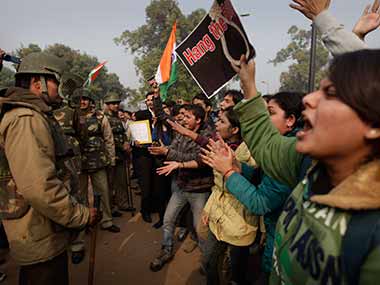In India, the demand for death to convicts ensues from a desire for vengeance not justice. This is a sign of a primitive society, and we must accept that educated Indians are not exempt from the feeling. It would not be incorrect to say that some of the more savage solutions for curbing crime originate from them. In our parts, lynching is not uncommon and, like the awful incidents with Blacks in the United States a century ago, it is acceptable by the public to wound or kill those who offend by stealing or by misbehaviour. This is also a product of that same desire for vengeance, and the emotion is felt strongly and collectively. The crowd takes offense even when it is not the victim, and feels entitled to join in handing out punishment. Mobs form dangerously quickly on the subcontinent and carry with them a primitive like-mindedness which makes them lethal. [caption id=“attachment_1125913” align=“alignleft” width=“380”]  The death penalty is a mindset of the angry middle class Indian: AP image[/caption] This attitude extends to politicians and political parties who legislate law against such behaviour, but are helpless before their emotions. An example is the incident in 2005 when a former minister, the Bharatiya Janata Party’s Ravishankar Prasad, was shot in the arm by a man, Munna Rai, on a stage during a rally. The BJP men on the stage battered Rai, who died from his injuries. The BJP is generally a good representative of India’s unthinking and angry middle class. It believes in and reflects the position of the mob and its leaders from LK Advani to Sushma Swaraj have long insisted on the death penalty for rapists. Crime can be solved by the state’s killing of as many criminals as possible in this view, and the desire to want criminals killed comes from that sense of feeling personally wounded. A parallel phenomenon is the coming together of middle-class groups who show up at protests against violent crime. These are not identified as being mobs, because they are immediately less violent, but actually remain equally savage in their intent. Their demands are for such things as hanging and castration. After the conviction of those accused in the infamous case of rape and murder in Delhi, CNN reported: “The same crowd outside the courthouse that cheered Friday’s death sentence for the four adults turned their ire on the juvenile. The crowd chanted, ‘Hang the juvenile.’” My beat as reporter was sessions court and I can say from experience that judges are drawn from society and feel its prejudices and emotions. We have a strange qualifier for the death penalty. It is only to be invoked in cases that are “rarest of rare. But it is difficult to explain or understand what this means and why one murder is different from another. Writing in Mint, my friend the abolitionist Yug Mohit Chaudhry wrote: “In the Bachan Singh case (1980), five judges of the Supreme Court upheld the constitutionality of the death penalty. At the same time, they severely limited its use and held that the death sentence can only be given in the rarest of rare case, where the alternative option of life imprisonment was “unquestionably foreclosed”, where there are no mitigating circumstances, and where evidence on record eliminates the possibility of the convicts’ reformation. Youth, a quintessential indicator of the potential for change and reform, was recognized as a mitigating circumstance, and the court explicitly stipulated that “If the accused is young or old, he shall not be sentenced to death.” Poverty and the personal circumstances of the offender (childhood abuse, abandonment, etc.) have also been held to mitigate the offense and merit the lower punishment by subsequent judgements.” He continues: “What purpose does the death penalty serve? There is no evidence that it deters murder more than imprisonment for life. In fact, the evidence shows the contrary. Hanging a few rapists will not make the streets safer for women, or make them more secure in their own homes. It will, however, camouflage governmental apathy and provide a much needed distraction from the core issues of women’s safety. It will allow politicians to say that they are tough on crime against women and get away without doing anything at all to address the causes of such crime. It will also allow us to vent out righteous indignation, and then rest content with the misogyny around us. It is not surprising therefore that most feminists oppose the death penalty for crimes against women.” This is true. It is the unthinking and emotional Indian who sees a solution in death.
The crowd takes offense even when it is not the victim, and feels entitled to join in handing out punishment.
Advertisement
End of Article
Written by Aakar Patel
Aakar Patel is a writer and columnist. He is a former newspaper editor, having worked with the Bhaskar Group and Mid Day Multimedia Ltd. see more


)
)
)
)
)
)
)
)
)



